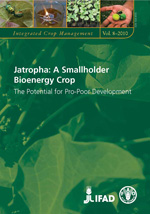The Food and Agricultural Organization of the United Nations (FAO) has recently released a new report that champions jatropha as a promising biodiesel crop especially for global rural farmers. The report, “Jatropha: A Smallholder Bioenergy Crop, the Potential for Pro-Poor Development,” set out to examine the potential for jatropha as a sustainable biodiesel crop and has been in development since 2008.
The authors write, “As developing countries face increasing local demand for energy in rural areas, they also must deal with both economic and environmental pressure on agricultural lands in general. The possibility of growing energy crops such as Jatropha curcas L. has the potential to enable some smallholder farmers, producers and processors to cope with these pressures.”
 The report says jatropha is a promising crop in part because it can grow on marginal lands, in drought conditions and animals do not graze on the crop. It also holds the promise of high oil output. The report also notes some of the feedstock’s drawbacks which include the fact that no consistently high yielding varieties have been developed and because the plant is toxic to both humans and animals, it can not be used for livestock feed, a major added value to most biofuel feedstock production.
The report says jatropha is a promising crop in part because it can grow on marginal lands, in drought conditions and animals do not graze on the crop. It also holds the promise of high oil output. The report also notes some of the feedstock’s drawbacks which include the fact that no consistently high yielding varieties have been developed and because the plant is toxic to both humans and animals, it can not be used for livestock feed, a major added value to most biofuel feedstock production.
Jatropha originated in Central America and is making headway in Africa and parts of Asia for biodiesel development. Experts predict that by 2015, Indonesia will be the largest jatropha producer in Asia, Ghana & Madagascar in Africa and Brazil in Latin America.
While the report ultimately favors the crop, it does caution that depending on how programs are developed, there could be significant environmental damage that would outweigh the positive environmental attributes of biodiesel.
The report does not study the possible future of jatropha in the U.S., although at this time there are a few studies underway. In addition, it is not recognized as a biodiesel feedstock under current Renewable Fuels Legislation (RFS2).

